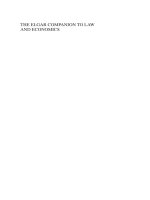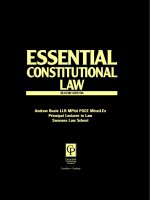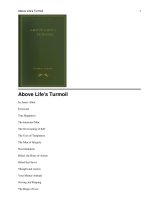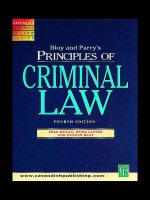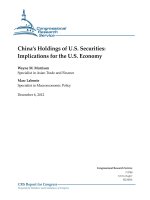LAW’S QUANDARY ppt
Bạn đang xem bản rút gọn của tài liệu. Xem và tải ngay bản đầy đủ của tài liệu tại đây (1.78 MB, 223 trang )
LAW’S QUANDARY
Steven D. Smith
Law’s Quandary
HARVARD UNIVERSITY PRESS
Cambridge, Massachusetts, and London, England
Copyright © 2004 by the President and Fellows of Harvard College
All rights reserved
Printed in the United States of America
First Harvard University Press paperback edition, 2007
Library of Congress Cataloging-in-Publication Data
Smith, Steven D. (Steven Douglas), 1952–
Law’s quandary / Steven D. Smith.
p. cm.
Includes bibliographical references and index.
ISBN-13: 978-0-674-01533-3 (cloth : paper)
ISBN-10: 0-674-01533-9 (cloth : alk. paper)
ISBN-13: 978-0-674-02573-8 (pbk.)
ISBN-10: 0-674-02573-3 (pbk.)
1. Law—Philosophy. I. Title.
K230.S627L39 2004
340′.1—dc22 2004052296
To Doug Smith,
my father and tacit mentor,
who wouldn’t have needed any of this
Contents
Preface ix
Part I Law and Metaphysics? 1
1 Just Words? 5
2 Ontological Dynasties 22
Part II (How) Is Law for Real? 39
3 Does “the Law” Exist? 41
4 The Jurisprudence of Modernity 65
Part III The Metaphysics of Legal Meaning 97
5 How Does Law Mean? 101
6 Author(s) Wanted 126
Part IV Mind the Gap 155
7 Law in a Quandary 157
Epilogue: Confusion and Confession 176
Notes 181
Index 203
Preface
A preface typically tries to say what a book is about; sometimes it also serves
to express acknowledgments. In my case, these purposes converge.
What is the book about? Well, I suppose I could describe it as an inquiry
into the recurring complaint that provides the title for the first chapter—the
complaint that accuses the vast, solemn outpourings of lawyers and judges
of being “just words.” But that sort of preview would be opaque—and po-
tentially embarrassing. (“You actually wrote a book—a whole book—about
whether law is just a lot of words? Have you no sense of irony? Nothing
more worthwhile to do with your time?”) Desperate to give the book
greater dignity, I might overcorrect and say that it’s about the metaphysics of
law, or about how our understanding of law has deteriorated due to our
wanton neglect (or, rather, our systematic suppression) of its ontological di-
mensions. But that sort of theme, baldly stated and standing alone, would be
merely misleading and also, in the current climate of opinion, alienating.
Who today has any use for “metaphysics” or “ontology”? Who has any clear
notion of what, if anything, those terms even mean?
So for now, I can better express what this book is trying to do more
obliquely, by offering two sets of acknowledgments. The first is to several
generations of mentors who lived and wrote just a little before my time and,
probably, yours. (I once met Lon Fuller, actually, but he was well past his
prime.) A half-century or a century ago, it was possible to write about juris-
prudence in a way that even the most celebrated legal thinkers of our own
era—Ronald Dworkin, for example, or Richard Posner—no longer manage,
and probably no longer aspire to. I have in mind three particular works: Oli-
ver Wendell Holmes’s essay “The Path of the Law,” Karl Llewellyn’s The
Bramble Bush, and Lon Fuller’s The Law in Quest of Itself. Given the choice be-
ix
tween any of these writings and, say, a good novel, I suppose that even
hardened professors of jurisprudence would choose the novel. So would I,
probably. Even so, these writings manage to convey arresting insights in a
way that is accessible, enjoyable, and even enriching in a general sense.
These writings are not “academic” in either the honorific or pejorative
sense of the term. Perhaps because the writings began as public lectures,
their authors present themselves as actual persons; they do not hide behind
the numbing, homogenized, pseudo-objectivism that academic conventions
often insist on. Their diction can be idiosyncratic, can sometimes even bor-
der on barbarous (especially in Llewellyn’s case). In discussing a thinker or
theory, they may resort to simplifying caricatures—caricatures that distort
but that can also illumine the essence of a thinker or theory in a way that
more ponderous description cannot.
Most importantly, Holmes, Llewellyn, and Fuller work on the assump-
tion—one that today might seem close to preposterous—that, as Fuller puts
it, “[jurisprudential q]uestions affect the fundamental bent of our lives.”
Thus, Llewellyn explains that his lectures seek to be at once a primer on
law—useful for beginning law students—and an expression of “some of the
more passionate convictions which motivate his living.” And in the last sen-
tence of “Path,” Holmes describes (with perhaps a touch of grandiloquence)
his aspiration to “connect [the] subject with the universe and catch an echo
of the divine.”
To put the point a bit differently, these writings of the early twentieth cen-
tury have a kind of multiple openness—openness to readers both specialists
and laypersons, openness in revealing the authors’ personal commitments
and not merely their professional positions and, even more important,
openness to the connections between law and the larger issues of life.
With few exceptions, such openness is scarcely discernible in even the
best jurisprudential writing in recent decades. Indeed, I suspect that most le-
gal scholars today would be embarrassed if these qualities were detectable in
their work—as if they had been caught in the performance of some private
function. Jurisprudential thinking in this respect has followed a familiar
course. In many disciplines, it seems, periods of zestful, insightful innocence
give way to periods notsomuch of decline, exactly, as of professional vir-
tuosity. Of scholasticism. Eminences of the later period—the virtuosos, the
scholastics—may look back on their predecessors with a mixture of respect
and condescension: they may view those predecessors as gifted novices.
In this spirit, contemporary legal philosophizing is no doubt more sophis-
x Preface
ticated—more methodical, more technically proficient—than Holmes’s,
Llewellyn’s, and Fuller’s writings were. And yet these jurisprudential vir-
tuosos and their productions may prompt the same reaction that Paradise
Lost provoked in Samuel Johnson: it is “one of those books which the reader
admires, lays down and forgets to take up again. Its perusal is a duty rather
than a pleasure.”
Here is an instance: I recall how, the first time I taught a jurisprudence
class at the University of Colorado, I assigned the students to read H. L. A.
Hart’s The Concept of Law. I later asked the class what they had thought of the
book. One student (who seemed bright but, obviously, not duly accultur-
ated) spat out his answer as if reacting to a piece of rotten meat. “I think it’s
pathetic,” he said, “that an intelligent person would spend his life writing
stuff as obscure and pointless, and dead, as this.” Taken aback, I explained
that Hart’s book is widely regarded as a classic and a model of clear thinking
and writing. What I said about the book was—is—true. Still, I have to admit
that I can understand—maybe even sympathize with—the student’s reac-
tion. And if this stinging criticism can be made of Hart—well, there is an a
fortiori lurking in the vicinity. So it is hardly surprising if, as I am told, stu-
dent interest in jurisprudence is on the wane. Nor is the decline limited to
students; it includes professors—even, I strongly suspect, professors of juris-
prudence.
So then, is it possible to resist the flow of history, and thus to write about
law with the same sort of openness sometimes achieved in an earlier period?
To talk about law in a way that speaks to both specialists and the laity, and
that “connects the subject to the universe and catches an echo of the di-
vine”? I’m not sure, but this book is an effort to do that. So I have tried to
take “Path” and Bramble Bush and Quest—not The Concept of Law and its ever
more meticulously ponderous successors—as models. (I have fallen short, of
course, in a whole variety of ways and for a whole variety of reasons.)
I should note one crucial qualification to what I have just been saying. Al-
though I have taken Holmes and Llewellyn and Fuller as mentors in what
you might call their “open” or “human” orientation to the subject, I have
not followed their substantive teachings on the nature of law. On the con-
trary. On the level of jurisprudential substance, these predecessors are more
nearly opponents than mentors, or perhaps mentors from whom I—and, I
believe, we—need to break away. Holmes and his successors operated in an
era that was determined to purge itself of “metaphysics” (whatever that is).
And they thought that in doing this they were acknowledging, and advanc-
Preface xi
ing, a sort of inexorable movement of history. Holmes and Llewellyn were
zealous for the movement; Fuller acquiesced in it. Everything these men
and their contemporaries say about law is tinged with, if not permeated by,
this anti-metaphysical animus.
A similar attitude still dominates the legal academy—and still, in my view,
paralyzes our efforts to understand law. But the older assumptions about the
inevitable course of history have by now been largely falsified, and it may be
possible to take a fresh look at the world—and at law, and at how law relates
to and reflects the world. Possible and also urgently necessary, because the
“Path” that Holmes pointed to and that generations of his dutiful followers
have trod, have trod, have trod has led to a jurisprudential dead end. That is
why, I believe, the quality of openness sometimes apparent in our predeces-
sors is now more opportune than the currently prevailing virtuosity that
seeks mainly to restate, analyze, criticize, and extend their various claims
with methodical care and ever greater sophistication. We need to emulate
our distinguished predecessors’ qualities of mind precisely so that we can get
beyond their substantive philosophies.
This observation leads to a second, briefer set of acknowledgments, which
I owe to a remarkable group of former colleagues at the University of Colo-
rado. When I moved to Colorado in 1987, Bob Nagel was already there, and
the next year Pierre Schlag arrived, and later Paul Campos and Richard
Delgado and Jean Stefancic and Rebecca French and Curt Bradley joined the
collection. (“Family” would emphatically not be the right word.) “Crits”
all—in a catholic and nonpolitical sense of the term. (I hope that none of
them is offended by the description.) Though these people differed tremen-
dously from each other in their philosophies, politics, interests, tempera-
ments, and life situations, they were all intellectually engaged and also icon-
oclastic in one way or another that made for endless and interesting
conversations. Perhaps the Colorado environment—its mountains, its fron-
tier innocence and remoteness from the sophisticated centers of high civili-
zation, maybe even its peculiar politics incongruously situating “the People’s
Republic of Boulder” in the state that became famous for the anti-gay rights
“Amendment 2”—contributed to the distinctive atmosphere. In any case, it
seemed possible there to raise questions—really to raise them, all sorts of
questions, about law and the Supreme Court and the legal academy and the
modern Western worldview—that somehow could not be taken as seriously
at other more self-consciously respectable institutions where I have studied
or taught.
xii Preface
That freedom did not lead to uniform conclusions, of course. Quite the re-
verse. For example, I am sure that Pierre Schlag influenced me (or “cor-
rupted” me, as a conservative friend wistfully told me) far more than I influ-
enced him, such that many of my views (including many expressed in this
book) by now probably owe much to Pierre even when I am no longer con -
scious of the debt. But in the end our outlooks were fundamentally differ-
ent. Pierre seemed constitutionally incapable of viewing what I will simply
call “faith” as a live option; and so for him critical openness was always a
path to despair. (Or at least to what in my view amounted to despair; but Pi-
erre did not see it this way.) For me, conversely, and for better or worse, it
seems that faith was and is inescapable, even though it is an ongoing and at
times frustrating struggle—for me as for many others—to articulate the basis
and content of that faith. Nor can this struggle be divorced from the effort to
understand law: hence this book.
These collegial differences made the exchanges all the more valuable, for
me at least. In any case, this book is an expression of years of such discus-
sions with Bob, Pierre, Paul, Richard, Jean, Rebecca, and Curt, to all of
whom I am deeply indebted. We have all moved on; but the book seemed
worth doing, among other reasons, as a sort of memoir of a decade of cor-
dially combative conversations.
Others have helped me with the book in more direct and usual ways. A
number of friends and associates generously read and commented on all or
part of the book: Brian Bix, George Wright, Chris Eberle, Larry Solum, Gail
Heriot, Paul Campos, John Garvey, David Brink, Richard Delgado, Laurie
Claus, Emily Sherwin, Mike Ramsey, Patrick Brennan, Mike Rappaport, Sai
Prakash, Tom Smith, Dan Rodriguez, Rick Garnett, Chris Wonnell, Richard
Posner, and Maimon Schwarzchild. Larry Alexander and Michael Perry de-
serve my special thanks for giving both substantial comments and also en-
couragement and moral support along the way; such friends are one of life’s
larger blessings. Another good friend, Joe Vining, returned the manuscript
with a barrage of marginal comments that, alas, I was unable on the whole
to assimilate adequately into the book; but the comments were so perceptive
and provocative that I almost wish they could have been printed along with
the book. I also benefited from questions and challenges in presentations of
parts of the book to the law faculties at Arizona State University, Emory Uni-
versity, and the University of San Diego. Much of the book was written
while I was on the faculty of Notre Dame Law School, and I appreciate the
support of the dean and faculty there. As always, I especially appreciate the
Preface xiii
moral support of my wife, Merina, and my children. And I owe a small debt
of gratitude to the Peace Corps: thanks to its administrative ineptitude my
daughter Rachel, who knows more philosophy than I do, was unexpectedly
able to spend several months with us in South Bend, and thus to read and
comment on an early draft before traveling to her assignment in Uzbekistan.
And Rosemary Getty provided invaluable assistance in preparing the manu-
script for submission.
Although none of the chapters here have previously been published, I
have in places borrowed and adapted passages and sections of three articles
with the permission of the original journals: “Believing Like a Lawyer,” 40
B.C. L. Rev. 1041 (1999); Copyright © 1999 Boston College Law School;
“Expressivist Jurisprudence and the Depletion of Meaning,” 60 Md. L. Rev.
506 (2001), used with the permission of the Maryland Law Review; “Non-
sense and Natural Law,” 4 S. Cal. Interdisc. L.J. 583 (1995), used with the per-
mission of the Southern California Interdisciplinary Law Journal.
I also thank the Princeton University Press for permission to quote from
Joseph Vining, From Newton’s Sleep (1994).
xiv Preface
LAW’S QUANDARY
PART I
Law and Metaphysics?
Jurisprudentially speaking, the twentieth century was a tremendously fer-
tile—and tremendously futile—era. In a lecture given on the eve of the new
century and destined to become the most celebrated and cited law review
article ever published, Oliver Wendell Holmes foresaw exciting, even revo-
lutionary developments in law and legal thought. In the not so distant fu-
ture, he predicted, law would leave behind the sterile parsing of precedents,
the haggling over rules and doctrines and, above all, the reverently moralis-
tic application of legal tradition that from medieval times had composed the
lawyer’s daily duties. Instead, the practice of law was destined to become,
and soon, a more rational and scientific enterprise—one that would make
heavy use of statistics and economics and “theory.” These changes were
“the inevitable next step, mind, like matter, simply obeying a law of sponta-
neous growth.”
1
His descendants routinely pay tribute to Holmes’s prescience. His “article
is a prophecy,” Richard Posner enthuses, “and it is coming true.”
2
“A cen-
tury later,” Mary Ann Glendon remarks (though not as happily), “lawyers
all over the world are marching to the measure of [Holmes’s] thought.”
3
The
conspicuous growth of law and economics is perhaps only the most obvious
fulfillment of Holmes’s predictions.
Curiously, though, from a different and perhaps more discerning perspec-
tive, it seems that nothing much has changed: the radical advances in law
anticipated by Holmes and repeatedly proclaimed by his followers look to be
a thing of the surface. The ways in which lawyers and judges (and even most
legal scholars) actually practice and talk about law are not so different than
they were a century ago—or even five centuries ago. Thus, the distinguished
historian and law professor Norman Cantor asserts that “[a] London barris-
ter of 1540, quick-frozen and revived in New York today, would need only a
1
year’s brush-up course at NYU School of Law to begin civil practice as a part-
ner in a midtown or Wall Street corporate-law firm.”
4
In his less sanguine
moments, Judge Posner (who comes as close as anyone to being a reincar-
nation of Holmes, or at least of Holmes’s more cerebral side) admits as much.
“The traditional conception of law is as orthodox today,” he laments, “as it
was a century ago.”
5
Few lawyers or judges today, Posner concedes, would admit to embracing
the formalistic legal methods and assumptions that Holmes deprecated. “Yet
most lawyers, judges, and law professors,” he observes glumly, “still believe
that demonstrably correct rather than merely plausible or reasonable an-
swers to most legal questions, even very difficult and contentious ones, can
be found—and it is imperative that they be found—by reasoning from au-
thoritative texts, either legislative enactments (including constitutions) or
judicial decisions, and therefore without recourse to the theories, data, in-
sights, or empirical methods of the social sciences.”
6
How to account for this gaping discrepancy between what was supposed to
happen and what by and large has happened (or, more accurately, has not
happened)? Some observers point to attitudinal and institutional factors.
Perhaps lawyers are traditionalist and conservative by nature—or maybe
just intellectually lazy? Or law schools have not adapted to the modern
world by teaching future lawyers the empirical and theoretical skills needed
to implement the newer visions of law. Other critics may attribute the fail-
ures of modern law to other sorts of factors—Weberian bureaucratic ratio-
nality, or capitalist ideology, or the cartel structure of the profession, or
an absence of the courage to face up to fears of “illegitimacy” or even “ni-
hilism.”
This book is devoted to advancing a very different (though not necessarily
incompatible) sort of explanation. The malaise of modern law and legal
thought, I hope to show, is a manifestation of what is at bottom a metaphysi-
cal predicament. And the way out of the malaise—if there is one (a question
about which I have no confident opinion)—will require us to “take meta-
physics seriously,” so to speak.
This claim will surely be met with incredulity, so I hasten to point out that
I am not the only observer of the law to offer some such diagnosis. I will try
to enlist a few allies (including some less than eager ones) as the discussion
proceeds. Still, there is no denying that this is not the usual explanation. In-
deed, the dominant view has been exactly to the contrary. It would not be
much of a stretch, as we will see in Chapter 4, to say that the central effort of
legal thinkers from Holmes through the Legal Realists through the modern
2 Law and Metaphysics?
proponents of “policy science” has been precisely to improve law by ridding
it of the curse of metaphysics.
7
In this vein, although Morris and Felix Cohen devoted a chapter in their
jurisprudence reader to “Law and Metaphysics” (which they defined, in
rather docile terms, as “the bringing to consciousness of what is assumed in
all legal argument”), they also anticipated skepticism—a skepticism that Fe-
lix Cohen’s own writings surely helped to fuel. So the Cohens acknowledged
that metaphysics is often viewed as “the effort of a blind man in a dark room
to find a black cat that isn’t there.”
8
This aversion to metaphysics has be-
come almost axiomatic in many quarters. Brian Bix observes that main-
stream legal thinkers like H. L. A. Hart have seen the “primary purpose [of
jurisprudence] as a kind of therapy: a way of overcoming the temptation to
ask metaphysical questions (‘what is Law?’ or ‘do norms exist’).”
9
Indeed, law has sometimes seemed an attractive field precisely because in
its nitty gritty practicality it has appeared to offer a refuge from metaphysi-
cal questions. Many lawyers and law professors (like many people gener-
ally) are constitutionally averse to philosophy, and Michael Moore suggests
that even “many philosophers became legal and political philosophers in part
to avoid metaphysical questions.”
10
Moore himself is an exception; he is
among the handful of legal theorists—totaling, maybe, a half-dozen or so?—
who occupy themselves with metaphysical issues. But at the conclusion of a
lengthy, learned article on the subject even he seems to concede that his
analysis has little or no practical payoff. The metaphysics of law, rather, is
just an abstruse subject that a few unusually constituted people happen to
find interesting: God knows why. (This is just a figure of speech, reflective of
my own perversity: Moore peremptorily assures us in the article, with no
hint of doubt or qualification, that God does not exist.)
11
The preceding paragraphs mislead, though, if they suggest that con-
tempt for metaphysics is limited to the field of law. Charles Larmore notes
more generally that “‘metaphysics,’ today functions mostly as a term of
abuse.”
12
When it occasionally comes up in actual conversation, the term is
nearly always dismissive: “metaphysical” conjures up a hazy, generally un-
appealing image of things musty, abstruse, unfathomable—“academic” in
the pejorative sense that connotes sterile quibbling about matters that have
no possible relevance to actual life and that consist mainly of abstract word
puzzles. (Except, that is, when “metaphysics” is taken as a code word for the
paranormal or exotic, as in the shelf label for a large section of literature in a
New Age bookstore I recall visiting in San Francisco.) Voltaire’s famous por -
trayal in Candide of the metaphysician Dr. Pangloss sponsors a different but
Law and Metaphysics? 3
equally unalluring image—of a pathetic and borderline-delusional thinker
who concocts airy and fantastic theories to escape from the messiness and
unpleasantness of the real world.
These unfavorable impressions will not likely be corrected—they may in
fact be reinforced—if you browse through a philosophy book dealing with
the subject. You will encounter alien terms like “possibilia,” “substitutivity,”
and “exemplifications,” used in connection with arguments about such less
than urgent (to most of us) questions as whether and in what sense num-
bers are “real,” or whether possible worlds that do not achieve actualization
can somehow be said to exist.
13
Indeed, many leading philosophers over the
last couple of centuries have themselves called for an end to metaphysical
speculation, arguing that the enterprise is futile or worse. A leading contem-
porary philosopher, William Alston, holds a more favorable view, but he
concedes that the sort of work that modern metaphysicians have turned out
makes them “sensitive to charges of engaging in parlor games during work-
ing hours.”
14
How then can a subject as removed and presumptively useless, if not ac-
tually pernicious, as metaphysics be the source of—or a possible remedy
for—any difficulties in law, legal discourse, or legal theory?
It is a hard question. I cannot try to answer it all at once: this is, after all,
the task of the book itself. But two preliminary qualifications may calm at
least some suspicions. First, my concern here is not with the whole range
of issues that get put under the heading of “metaphysics” but, more spe-
cifically, with the subcategory sometimes called “ontology,” which is the
subset of the discipline that addresses the question of “what there is”—of
“the primary constituents of this or any possible world, the very alphabet of
being.”
15
Second, I myself am a law professor, not a metaphysician (or even
a philosopher), and I can boast of only brief skirmishes with academic meta-
physics. The argument in this book turns not so much on the rarified ques-
tions that academic philosophers spend their lives pondering as on what we
might call “practical metaphysics.”
That term may seem oxymoronic. So the chapters in this first part attempt
to explain how law might present, at its core, questions that are at once
thoroughly practical and deeply metaphysical, and how neglect of those
questions might render our talk about law a form of highly refined “non-
sense.” (Which, of course, is just what law-talk looks like to many critics,
both within and outside the legal profession.)
4 Law and Metaphysics?
CHAPTER 1
Just Words?
Lawyers (and judges, and law professors) are targets of derision on a vari-
ety of grounds; but some of the most familiar criticisms disparage the way
they—I suppose I should say we—talk, or the words we use. One criticism
castigates lawyers for using too many words. I still recall the crestfallen look
on the face of Sud, the stolid old farmer who was my boss for three fruitfully
destructive summers at the Bonneville County (Idaho) Weed Control, when
a fellow worker told him I wouldn’t be back the next year because I was go-
ing off to law school. “You’re gonna be one of them . . .”—he groped for
words—“. . . them talkin’ bastards?” A related criticism attacks lawyers (and
judges, and law professors) for using the wrong words—for using a vocabu-
lary that is obscure, or dishonest, or not cogent.
Almost imperceptibly, these criticisms shade into a subtly different one.
The complaint is that lawyerly discourse is empty. It is just words, or merely
words, or nothing but words.
This last is a long-standing charge, but it is also enigmatic. What else
would a discourse be if not words? What exactly are the critics complaining
about? If we could answer that question, we might gain a valuable insight
into the nature of law—and into the deficiencies of modern thinking about
law.
Troubling Judgments
We might start with a recent article by Deborah Rhode, former president of
the Association of American Law Schools, in which these intermingled ob-
jections are presented. Rhode’s specific subject is not law-talk in general but
rather legal scholarship. She begins by suggesting that a good deal of legal
scholarship (including, she endearingly admits, some of her own) deserves
5
the description once given of Warren Harding’s speeches: “an army of
pompous phrases moving over the landscape in search of an idea.” The
work is “bloated,” characterized by an “offputting length and style.” In fact,
there is a consensus that “too much work is trivial, ephemeral, unoriginal,
insular, pretentious or simply irrelevant.”
1
This harsh description is not pe-
culiar to Rhode: she cites Richard Posner’s judgment that a great deal of legal
scholarship is “trivial, ephemeral, and soon forgotten,” Dan Farber’s descrip-
tion of the “intellectual aridity” of legal scholarship, and Robert Gordon’s
opinion that much legal scholarship is “horribly pretentious and vacuous.”
2
It is little wonder, therefore, that most law review articles go wholly un-
cited. The authors of these involuntarily diffident articles may console them-
selves—ourselves—with the thought that surely someone, somewhere, is
reading our articles, but just not citing them. Sadly, the reverse is proba-
bly even more likely: “What seems substantially more plausible”—Rhode
shows no pity—“is that many of the 30,000 other articles were cited but not
in fact read by commentators seeking scholarly embellishment.”
3
(I promise
that I did read Rhode’s article—or at least skimmed it.)
The picture is dismal: broad, winding rivers—meandering into oceans—of
words, but very little real substance. Too many words; too little content.
Rhode is talking about legal scholarship, though: perhaps the discourse of
actual lawyers and judges is different? Judicial opinions, obviously, cannot
be said to be “just words” in the same sense that scholarship can (as a losing
litigant becomes painfully aware when the sheriff executes on her car or her
bank account, or when the warden locks him in jail). Nonetheless, it is
doubtful (to put the point charitably) whether the actual contents of judi-
cial opinions—the words themselves—are more cogent or robust than the
contents of legal scholarship. Most legal scholarship employs pretty much
the same vocabulary that judicial opinions do anyway—hopes and fears to
the contrary notwithstanding, Rhode reports, most legal scholarship is still
mainly “doctrinal” in nature
4
—so it would be surprising if that vocabulary
were vacuous when used by scholars but rich with content and connection
when uttered by lawyers and judges. Indeed, the common view has been
just the reverse—that judicial opinions are less substantial, more merely
conclusory, than legal scholarship. Insofar as some legal scholarship (law
and economics scholarship, for example) adopts a more distinctive dis-
course, that distinctiveness largely reflects an effort to avoid the perceived
emptiness of conventional law-talk.
Reading in the primary materials will do little to dispel this gloomy per-
6 Law and Metaphysics?
ception. Thus, noting that Supreme Court opinions seem “increasingly arid,
formalistic, and lacking in intellectual value,” Dan Farber observes that
these opinions “almost seem designed to wear the reader into submission as
much as actually to persuade.”
5
With reference to an opinion by Justice Pot-
ter Stewart that he takes to be typical of modern judicial decisions, Alexan-
der Aleinikoff echoes the familiar charge: “Although Stewart’s opinion uses
all the right words, in the end they are simply that: just words.”
6
Michael
Paulsen, in describing Supreme Court opinions as “arid, technical, unhelp-
ful, boring, unintelligible,” “formulaic gobbledygook,” uses adjectives
only slightly less severe than those he deploys against legal scholarship
(which he finds to be “incomprehensible, pretentious, pompous, turgid, re-
volting, jargonistic gibberish”).
7
So whether uttered by law professors or judges, it seems that law-talk is
vulnerable to the same charge: it is profuse, but vacuous. Just words.
I have been quoting recent indictments, but in fact the criticism is a vener-
able one. The youthful Karl Llewellyn attacked lawyers’ tendency to use
“words that masquerade as things.” A good deal of legal discourse “is in
terms of words,” Llewellyn complained: “it centers on words; it has the ut-
most difficulty in getting beyond words.”
8
A few years before, Herman
Oliphant had criticized legal scholars for “erect[ing] alawofruling cases
composed of word patterns largely detached from life.”
9
And two decades ear-
lier, Roscoe Pound had said much the same thing: lawyerly argumentation,
Pound thought, was pretty much just “empty words.”
10
So the criticism is a recurring one. But as noted, the criticism also presents
a puzzle. No one could seriously contend, after all, that law—or the legal sys-
tem—is “just words.” Law encompasses too many muscular or at least cor-
poreal things—lawyers and judges and litigants and sheriffs, courthouses
and jails, robes and gavels—that are plainly not “just words.” So it seems the
criticism must be targeting not law or the legal system as a whole, but rather
legal discourse, or law-talk. Thus qualified, the criticism may seem to lose its
sting. How severe a charge is it to say that a form of discourse is “just
words”? What else could it be?
What do the critics—the people who complain that law-talk is “just
words”—want anyway? Pictures to go with the text, maybe? Fistfights to
go with the legal arguments? In ordinary contexts we sometimes say that
someone (a salesperson, a sweet-talking Don Juan) is guilty of uttering “just
words” when she is being dishonest, or when he doesn’t really mean what
he says. (“You’re the only one I’ve ever loved.”) But it is hard to transfer this
Just Words? 7
criticism intact to, say, legal scholarship. (“Sure, Professor Zilch says equal
protection doctrine supports intermediate scrutiny for benign racial prefer -
ences. He says it, but does he really mean it?”) So the old criticism—it’s all
“just words”—seems to circle back against itself: the criticism itself comes to
look like “just words.”
Still, it would be rash to dismiss too easily an objection that is so recurrent
and so seemingly earnest. So we should look at the charge more closely.
What might the complaint be asserting? What is it, exactly, that is bothering
these critics?
Ontological Inventories
Start with a commonsensical proposition: our language, and the particular
statements we make, implicitly presuppose that the things we name “exist,”
or are “real,” in some sense or another. Suppose you say “My grandfather
owns a cattle ranch in the West”: you implicitly assume that there is some-
one who is your grandfather, some thing or things that are cattle, and some-
place that is the West. Otherwise, your statement would have no meaning; it
would be so much gibberish (much in the way that Lewis Carroll’s famous
poem beginning “’Twas brillig and the slithy toves did gyre and gimble in the
wabe” is gibberish to most of us, at least until we translate the line or supply
imaginative referents for “toves” and “wabe” and “brillig”). We might say
that our language, and our uses of language, manifest an implicit ontology—
a sort of inventory of the kinds of things that we take to be real in some
sense or other, and that can be signified or referred to with words.
Philosophers sometimes describe this aspect of our talk in terms of onto-
logical “commitment.” Thus, W. V. O. Quine explained that “[w]e commit
ourselves to an ontology containing numbers when we say that there are
prime numbers larger than a million; we commit ourselves to an ontology
containing centaurs when we say there are centaurs; and we commit our-
selves to an ontology containing Pegasus when we say Pegasus is.”
11
Lacking
such commitment, our talk would be empty—just words. Indeed, our talk
would be “just words” in a way that seems at least distantly related to the
similarly phrased criticisms we make of the salesperson or scheming seducer
who, we say, lacks genuine commitment and therefore utters “just words.”
So, is this what the criticism of law-talk as “just words” intends to say—
that legal discourse uses words not backed up by any real and sincere onto-
logical commitment? Before pursuing the question, we need to notice some
8 Law and Metaphysics?


